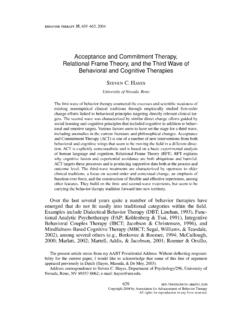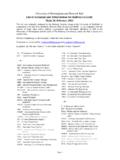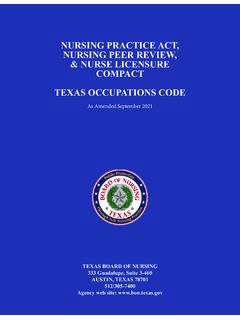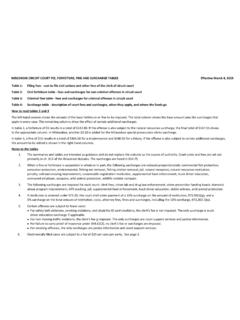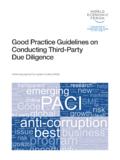Transcription of Summary of Fuller, 'The Case of the Speluncean Explorers'
1 Summary of Fuller, 'The case of theSpeluncean Explorers' Wednesday, 25 February 2015 This is a Summary of a fictitious case created in Lon L Fuller, The case of theSpeluncean Explorers (1949) 62(4) Harvard Law Review 616. The case takes place inthe equally fictitious Commonwealth of Newgarth , and Fuller s article contains fivejudicial opinions that explore the facts from different legal perspectives. It is useful as anillustration of the scope and diversity of Anglo-American legal philosophy in the factsA group of cave explorers (spelunkers) are trapped by a landslide. Approachingstarvation, they make radio contact with the rescue team. Engineers on the rescue teamestimate that the rescue will take a further 10 days. After describing their situation tophysicians, they are told it is unlikely that they wil survive another 10 days without explorers ask the physicians whether they would survive if they killed and ate one oftheir number.
2 The physicians advise, reluctantly, that they would. When asked if theyought to hold a lottery to determine whom to kill and eat, no one on the rescue team iswilling to radio is turned off, and later a lottery is held. The loser is killed and eaten. When theyare rescued they are prosecuted for murder, for which, in the Commonwealth ofNewgarth, a guilty verdict carries a mandatory sentence of capital opinions of the Articles NotesThe defendants were initially convicted and sentenced to be hanged by the Court ofGeneral Instances of the County of Stowfield but have brought a petition of error beforethe court. Truepenny CJ provides a more complete overview of the facts than is judge gives a separate opinion: Truepenny CJ,Judgment of Truepenny CJStatement of factsThe four defendants and the deceased were part of the Speluncean Society , anamateur cave-exploration organisation, and became trapped in a cavern as a result of alandslide.
3 The remote location made rescue difficult, time-consuming and expensive. Tenworkmen were killed in the addition to the Society s funds, it took an additional 800,000 Frelars (ie, the currencyof the Commonwealth of Newgarth) provided by popular subscription and legislativegrant to rescue the explorers. After 32 days, they were on it was recognised that death by starvation was a possibility. On the 20th day, itwas realised that the explorers had a two-way radio of sorts and oral communication engineers informed the explorers that at least 10 more days would be needed torescue them. Upon further inquiries, a team of medical experts informed that explorersthat considering the conditions and rations inside the cave, the chances of survival for afurther 10 days were explorers asked whether they would survive if they resorted to cannibalising one ofthe number.
4 It was reluctantly confirmed they could. Whetmore asked if casting lots as towhom should be eaten was advisable; no physician, judge, government official, ministeror priest would provide an further messages were received from within the cave. When the explorers werereleased, it was learned that on the 23rd day after entering the cave, Whetmore hadbeen killed and defendants testimony, accepted by the jury, was as follows:Whetmore proposed that they derive the necessary sustenance from killing andeating one of their number. Whetmore also proposed casting lots, using a pair ofdice he happened to have with him. Initially the defendants were reluctant to adoptthis desperate measure, but agreed when hearing the radio conversations. Theexplorers devised and agreed upon a method of using the dice to cast the dice were cast, Whetmore withdrew from the arrangement claiming hewould wait another week.
5 The others charged him with a breach of faith andproceeded to cast the dice. Before throwing the dice on his behalf, the defendantsasked Whetmore to declare any objections to the fairness of the throw. He did notobject, and the throw went against was put to death and defendants were treated for malnutrition and shock, then indicted for murder. At trial,the foreman of the jury (a lawyer by profession) asked the court whether the jury couldfind a special verdict that left it to the court to say whether, on the facts as found, thedefendants were guilty. Both prosecution and defence accepted the facts as found by the jury, the trial judge ruled the defendants were guilty ofmurder and sentenced them to be hanged, the mandatory , the jury joined in a communication to the Chief Executive of Newgarth,requesting the sentence be commuted to imprisonment of six months.
6 The trial judge didsimilar. The Chief Executive waits for the Supreme Court s disposition of the petition oferror before making a decision regarding CJ holds the course taken in the first instance to be fair and wise ; and theonly course open to be taken. The Chief Justice acknowledges that no exception to thestatutory provision applies, regardless of how sympathetic people may Chief Justice prefers to rely on possible executive clemency, described as mitigating the rigors of the law , and proposes that the Supreme Court joins in thecommunication to the Chief Executive, expecting clemency to be granted. Justice canbe done in this way, without disregarding either the letter or spirit of the , Truepenny CJ upholds the of Foster JFoster J criticises Truepenny CJ s attempt to escape the embarrassments of this tragiccase.
7 His Honour believes that the very law of Newgarth is on trial, and if the defendantsare found to have committed a crime the law of Newgarth is convicted in the tribunal ofcommon sense .The first ground for this opinion is that positive law s foundation is the possibility of humansocial coexistence. Where this coexistence becomes impossible, the conditionunderlying the law ceases to exist. Foster J states that the maxim cessante ratione legis,ceassat ipsa lex ( the reason for a law ceasing, the law itself ceases ) applies (thoughacknowledging it is not usually applied to the whole of the enacted law).Foster J considers the coexistence principle to be axiomatic. All law, regardless ofsubject, is directed towards facilitating and improving human coexistence regulatingfairly and equitably the relations of their life in common.
8 Foster J states clearly:When the assumption that men may live together loses its truth, as it obviously did inthis extraordinary situation where life only became possible by the taking of life, thenthe basic premises underlying our whole legal order have lost their meaning J holds that the explorers were outside the jurisdiction of the Commonwealth: Ifwe look to the purposes of law and government, and to the premises underlying ourpositive law, these men when they made their fateful decision were as remote from ourlegal order as if they had been a thousand miles beyond our boundaries. The explorers were not in a state of civil society but in a state of nature andconsequently the laws of the Commonwealth of Newgarth do not apply. The principles oflaw to be applied are those that were appropriate to their condition, and under thoseprinciples they were guiltless of any crime.
9 [In common law jurisprudence, such approaches have been rejected. Consider, as theleading example, the case of R v Dudley (1884) 14 QBD 273 DC where necessity wasrejected as a defence to murder. In that case , two shipwrecked men killed and ate acabin boy who was in a coma. On the other hand, in Cooper v Stuart (1888) 14 App Cas286, the Privy Council held In so far as it is reasonably applicable to the circumstancesof the Colony, the law of England must prevail, until it is abrogated or modified, either byordinance or statute , basing this on Blackstone s Commentaries.]Foster J argues that It has from antiquity been recognized that the most basic principleof law or government is to be found in the notion of contract and considers that theagreement to cast lots was a new charter of government appropriate to the situation.
10 Dismissing sceptics, Foster J asserts that it is clear that Newgarth s government isfounded on some sort of voluntary charter of government to which the currentgovernment can trace itself. The authority to punish is derived from the original compactand no higher source; what higher source should we expect these starving unfortunatesto find for the order they adopted for themselves? [Fuller has Foster J say Sophistical writers have raised questions as to the power ofthose remote contractors to bind future generations . A constitutional contract does notoperate the same as a civil contract, I would suggest.]If it was proper that .. ten lives should be sacrificed to save the lives of fiveimprisoned explorers, why then are we told it was wrong for these explorers to carryout an arrangement which would save four lives at the cost of one?
